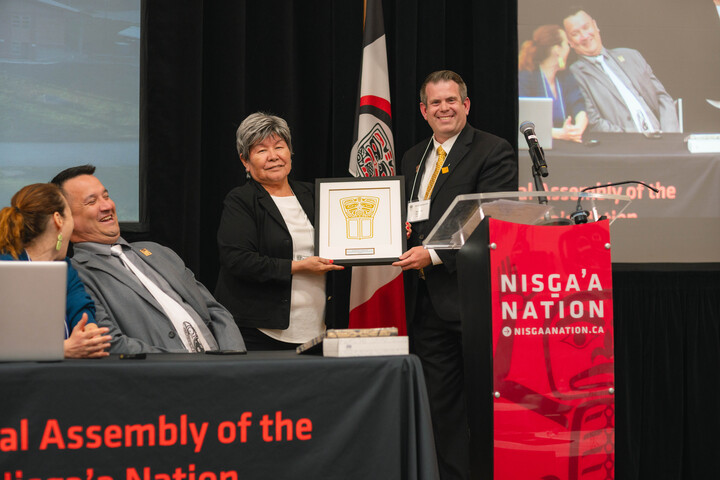
Reconciliation
Nisg̱a'a Nation breaks ground with Indigenous-led connectivity
Sep 8, 2023
(ABOVE) Nisg̱a'a Nation is embarking on a nine-million-dollar project to bring wireless service to the entire Nass Valley (pictured), in collaboration with TELUS and with funding from Innovation, Science and Economic Development (ISED). Photo courtesy of Nisg̱a'a Lisims Government.
Gitlaxt'aamiks resident Andrew Borne is relieved to know the days of poor cell reception while travelling in his community are coming to an end.
Safety has long been a concern for Nisg̱a'a citizens, visitors and even first responders because there’s no reliable phone service along the roads connecting the four remote villages on Nisg̱a'a Lands, located in the Nass Valley in northwest British Columbia.
“Without cellular coverage, and with hours sometimes between commutes, you don't know where your loved ones are,” said Borne, Director of IT with
Nisg̱a'a Lisims Government
and Chief Executive Officer with Lisims Internet and Technology Services
.Fortunately, that connectivity gap is coming to a close following an innovative and Indigenous-led partnership. Nisg̱a'a Nation is embarking on a nine-million-dollar project to bring wireless service to the entire Nass Valley, in collaboration with TELUS and with funding from the Government of Canada’s Innovation, Science and Economic Development (ISED).
This connectivity will bring residents like Borne peace of mind. Critically, it will also open new avenues to long-term health and prosperity for the entire community, increasing access to virtual healthcare, remote education and economic growth.
That, in turn, means a brighter future for Nisg̱a'a citizens, allowing the flexibility to stay in or return to the Nass Valley.
That, in turn, means a brighter future for Nisg̱a'a citizens, allowing the flexibility to stay in or return to the Nass Valley.
“It's going to give us an unprecedented opportunity, especially for our young people. This builds our capacity for our youth to learn here, build here, educate here, and go anywhere in the world and use these skills,” said Borne.
For those who are not in the Nass, connection with their culture and community will be just a phone call away.
“Wherever the Nisg̱a'a may be, they can now feel a lot closer, and a lot more comfortable, and a lot more proud to be Nisg̱a'a, because of this initiative,” Borne added.
Economic Reconciliation in action
In 2000 the Nisg̱a'a Nation made history, signing the first-ever modern treaty in B.C. recognizing the Nation’s inherent self-government. It also recognized Nisg̱a'a title to 2,019 square kilometers of land in the Nass Valley, home to an estimated 1,810 Nisg̱a'a members. Another 6,192 members live elsewhere in the country and abroad.
Nisg̱a'a Lands are also home to Lisims Internet and Technology Services (LITS), one of the first Indigenous-owned and operated telecommunications networks in Canada.
“It’s always been a motto for the Nation to work together and be leaders, using our own infrastructure, our own networks, our own people,” said Borne.
When exploring solutions to increase wireless connectivity, it was critical to the Nation that any new projects on Nisg̱a'a Lands be Indigenous-led.
It was a key principle in the discussions that began more than 18 months ago between Nisg̱a'a and TELUS, as they searched for opportunities to collaborate and enable connectivity to the Nation.
“It just kind of blossomed,” said Borne. “TELUS was looking for a way to work with Indigenous communities, and we were looking for a relationship that could grow.”

New connectivity is expected to boost safety along highways connecting the four remote villages on Nisg̱a'a Lands. It will also open new avenues to long-term health and prosperity for the entire community, increasing access to virtual healthcare, remote education and economic growth. Photo courtesy of Nisg̱a'a Lisims Government.
Stemming from that relationship, the partners negotiated an agreement for TELUS to construct the cellular towers, funded by Nisg̱a'a and ISED. Under the agreement, TELUS is also committed to providing network technology training to support Nisg̱a'a citizens to maintain the infrastructure and grow the capacity of LITS.
“Here, you have a unique situation where you have a modern treaty government who owns a lot of its own infrastructure, and TELUS is building up on that system with technical knowledge, and helping to support the Nisg̱a'a Nation with tools to make the lives of Nisg̱a'a citizens and guests on our lands better,” said Andrew Robinson, Industry Relations Manager, Nisg̱a'a Lisims Government.
"Economic Reconciliation is at the forefront of this partnership.”
The partnership with Nisg̱a'a follows TELUS’ investment of $18.5 billion to build and develop network infrastructure, operations and spectrum across B.C. over the next five years. As a company that has been headquartered in Western Canada for more than 125 years, the investments build on the more than $59 billion TELUS has invested across B.C. since 2000, ensuring that British Columbians can stay connected to what matters most, including healthcare, safe and healthy food, online education, friends and family, and the flexibility to work remotely; all with the accompanying environmental benefits.
Across Canada, TELUS will have committed $81 billion by 2027.
The investments also further TELUS’ commitment to Indigenous Reconciliation. In 2021, the tech company became the first in Canada to launch a formal
Indigenous Reconciliation Action Plan
, built around four key guiding pillars: connectivity, enabling social outcomes, economic Reconciliation and cultural responsiveness and relationships. TELUS tracks its progress against its concrete targets and goals in its annual Indigenous Reconciliation & Connectivity Report
.“It is a privilege to work with and learn from the Nisg̱a'a citizens as they lead the project. This is what Reconciliation in action looks like,” said Shazia Zeb Sobani, TELUS Vice-president of Customer Network Planning. “Through purposeful agreements like this, we are demonstrating our commitment to build meaningful relationships and engage with Indigenous communities to support their long-term success in the ways they want to be supported.”
To learn more about TELUS’ commitment to Reconciliation, visit
telus.com/reconciliation
.

